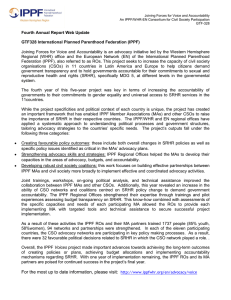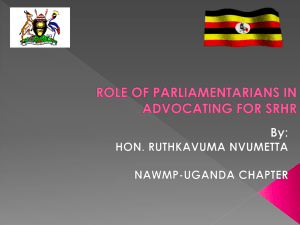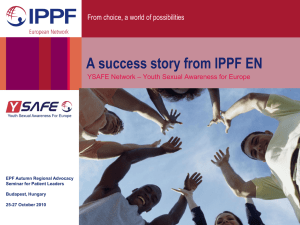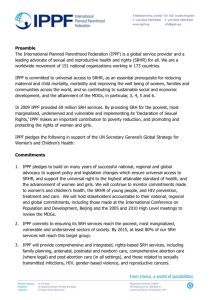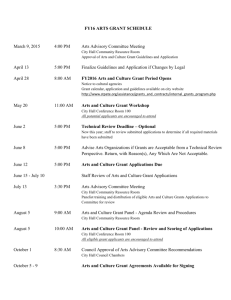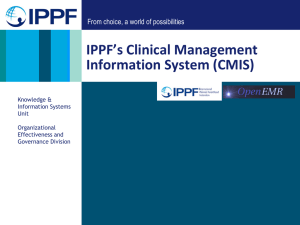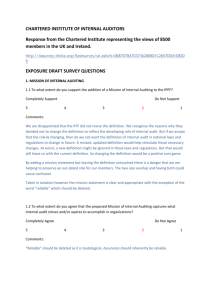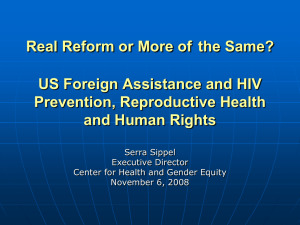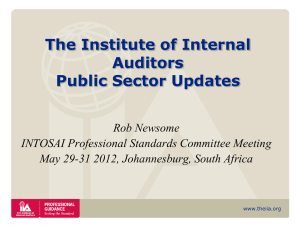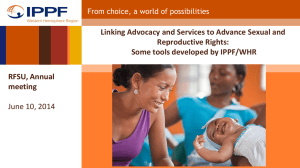Application Guidelines - International Planned Parenthood Federation
advertisement
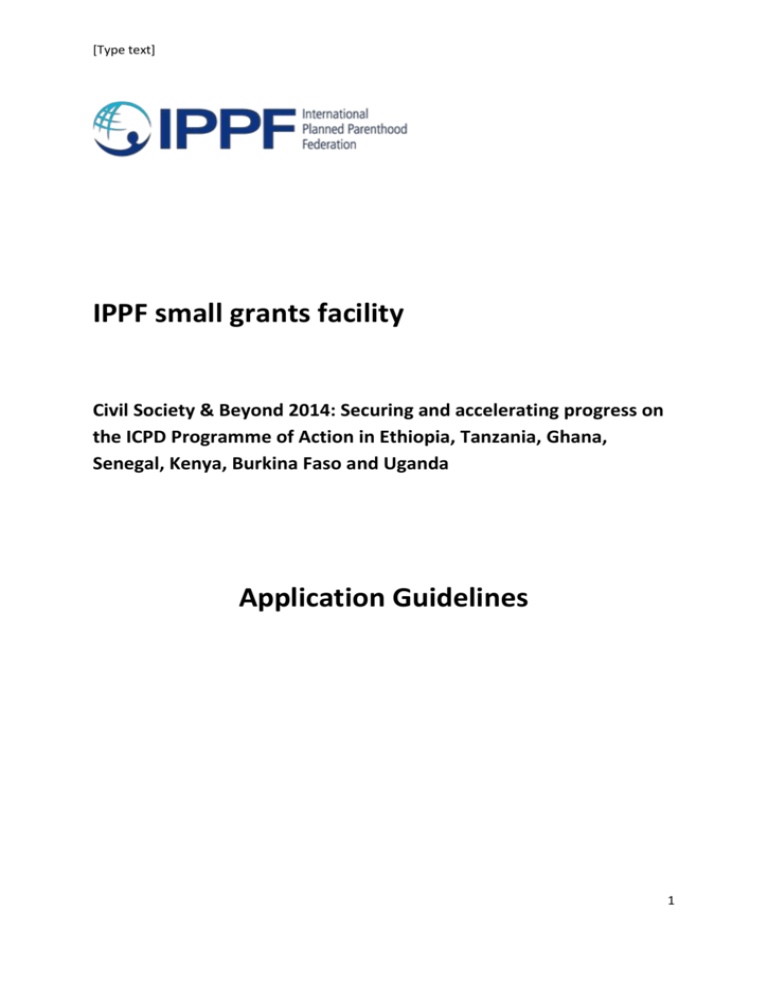
[Type text] IPPF small grants facility Civil Society & Beyond 2014: Securing and accelerating progress on the ICPD Programme of Action in Ethiopia, Tanzania, Ghana, Senegal, Kenya, Burkina Faso and Uganda Application Guidelines 1 [Type text] CHAPTER ONE: What is the IPPF Small Grants Facility? Purpose Key principles of operation Funding levels CHAPTER TWO: Eligibility and Selection Procedure The NGO Forum Small Grants Facility supports ADVOCACY What kind of activities does the NGO Forum Small Grants Facility support Conditions for funding Assessment criteria for applications Selection procedures Timetable Geographical eligibility CHAPTER THREE: Application Procedure Application procedure Preparing your application Submitting your application CHAPTER FOUR: Completing your application Section One: project summary Section Two: organizational details Section Three: purpose and outline of the project Section Four: budget information Section Five: checklist CHAPTER FIVE: General Conditions of the grant Branding Changes of plan Budget alterations Reports Specific conditions Payment of grants Evaluation Reporting Schedule 2 [Type text] CHAPTER ONE: What is the IPPF Small Grants Facility? Purpose 2014 marks the twentieth anniversary of the International Conference on Population and Development (ICPD). 2015 is the year the successor to the Millennium Development Goals will be negotiated and adopted. The outcome of these processes will greatly impact future population dynamics and SRHR policy, funding and programming priorities at global level and at national level. The on-going ICPD review offers a unique opportunity to review the evidence base, and find out where gains have been made and work needs to be done in terms of universal access to sexual and reproductive health and rights, population dynamics and to make sure these are at the core of our asks for the next development framework. It also offers the opportunity to convene and mobilize civil society (CS), to work with governments to make sure population dynamics and SRHR is positioned at the centre of policy priorities for national governments and their positions in regional and global negotiations. Particularly those connected to the post 2015 development framework. CS has a critical role to play in influencing government priorities and positions for these negotiations. To ensure that CS engagement in these processes is strong, meaningful and has impact IPPF is launching a funding facility and between now and 2015 to support CS engagement in these policy processes. Key principles of the IPPF Small Grants Facility? Objectives: Increase the capacity and collaboration of CSOs and networks working at the national level in Ethiopia, Tanzania, Ghana, Senegal, Kenya, Burkina Faso and Uganda to engage with national governments to influence positions for negotiations related to the ICPD beyond 2014 review and the post 2015 development framework. To position population dynamics and SRHR and the emerging issues and priorities of the ICPD as a priority for governments when participating in processes and negotiating the post 2014/5 framework Successful applications must demonstrate a clear plan to undertake one of the following: Enable CSOs to raise awareness at a ministerial level about the importance of SRHR and population dynamics prior to global policy debates and ensure that these issues are prioritised in government positions. Enable CSOs to undertake advocacy work after the global event (CPD, Financing for Development, the intergovernmental negotiations on the post-2015 development agenda and any other post- 2015 events) to ensure that positions are communicated at national level and governments are held accountable to them. 3 [Type text] Support CSOs to ensure population issues and SRHR are represented in post 2015 development framework targets and indicators. GIZ contributed to recent discussions leading to the development of indicators for the ICPD beyond 2014, and civil society is beginning dialogues on what indicators they would like to see in the next development framework. Proposals that link into the on going work around indicator development for frameworks such as FP 2020 and post- 2015 to help get political buy in for the indicators will also be considered for funding. Funding Levels The maximum grant amount for all grants is $25,000 or 18,500 euros All grantees must provide 10% match funding. The deadline for applications is midnight GMT 09:00 GMT, 28 January 2015 Download the application guidelines and form at: http://ippf.org/our-work/what-we-do/advocacy/icpd/grants or email songsfund@ippf.org CHAPTER TWO: Eligibility and Selection Procedure The IPPF Small Grants Facility supports ADVOCACY – national advocacy influencing global policy – related to the ICPD and Post 2015 Advocacy means identifying and calling for change at the political level. It refers to the different ways we can build political, financial or public support to bring about action for change. It involves influencing leaders and decision-makers to address the root causes of problems and to generate long-term sustainable solutions. The review of the ICPD PoA and the MDGs offer important opportunities to reprioritize SRHR and population dynamics in global policy dialogues. This is important as global policy influence funding and policy priorities at the country level, and this impact on programming access to services. Sometimes, advocacy is confused with IEC (Information-Education-Communication). Advocacy aims to achieve the objectives listed above by targeting policy-makers, decisionmakers, governments, donor agencies and other leaders. It is more than raising awareness it calls for concrete action and changes to policies, programmes and structures. IEC, on the other hand, aims to inform, educate or communicate on a specific topic or to raise awareness and arouse interest on an issue. IEC is targeted towards specific population groups (e.g. young people, PLHIV, etc), individuals or the general public. The main goal of 4 [Type text] IEC is to inform, educate and sometimes change individual behaviour. However, it does not try to effect changes in policies, programmes, laws or structures. National priorities influencing global priorities: Civil society has a role to play in helping their governments come up with strong positions on SRHR and population dynamics, and ensuring that your national priorities are reflected in global policy. National governments need strong positions on these issues, so they have a strong position on these issues when they send delegations to global policy dialogues. As global policy is negotiated and agreed by countries at the United Nations it is critical that your government has a strong position in support of SRHR and population dynamics, and that these are known, understood and championed by those individuals who are representing your government in these negotiations. There are several ways in which this can happen: You can work with your Ministry of Health and Foreign Affairs at national level to influence their position. Your messaging should also be sent to your countries mission in New Yorkcontact details found here: http://tinyurl.com/nybvat3 You can get on your governments delegation to international meetings such as Commission on Population and Development, or other global meetings related to the post 2015 development framework You can influence your government delegation by organising briefing meetings for them What kind of activities does the IPPF Small Grants Facility Support? 1. A clear plan to communicate positive messages about population dynamics and SRHR to governments who are sending delegations to global policy events relating to post 2015 and the ICPD; 2. A clear plan to participate in government delegations at global policy events and do follow up advocacy at the national level to ensure national follow up of global policy debates. Global policy events can include: the the intergovernmental negotiations on the post-2015 development agenda, the UN Development Programme national consultations on post 2015; Commission on the Status of Women regional and national reviews Have a clear plan for follow up work on accountability and transparency over the following 9 months, at national level. Work at the national level or regional level Conditions for funding Applicants must satisfy all the following conditions to be considered for funding: 5 [Type text] The proposals must respond to the type of activities the IPPF Small Grants Facility supports. A clear plan to participate in, and champion SRHR and population dynamics in national government positions and government delegations at events linked to post 2014/5 and to advocate at the national level before and after global policy events linked to post 2014/5.These can include: the intergovernmental negotiations on the post-2015 development agenda, the UN Development Programme national consultations on post 2015; Commission on the Status of Women regional and national reviews and other emerging processes and modalities that will offer opportunities for governments to champion SRHR and population dynamics as critical to the next development framework; A plan to tap into existing work taking place around indicator development and data use – particularly relating to FP2020 and the ICPD review process and the new development agenda/Post 2015 process to advocate for indicators and targets relating to population dynamics and SRHR in the next development framework, in order to hold governments accountable for the delivery of development outcomes A clear plan for follow up work on accountability and transparency over the following 9 months, at national level. CSOs must work at the national level and have a programme of influencing government policy and positions in Ethiopia, Tanzania, Ghana, Senegal, Kenya, Burkina Faso and Uganda CSOs currently or with past experience on government delegations will be given particular consideration Assessment criteria for applications The applications will be assessed according to the following criteria: Support advocacy activities in the two areas identified areas that the IPPF Small Grants Facility supports Be relevant to increasing political for the ICPD Programme of Action and /or SRHR and population dynamics in the next development framework at national or national and global levels Have a clear advocacy expected outcome related to positioning SRHR in the next development framework Selection procedures All administration, processing, selection and management of applications will be done by the IPPF Small Grants Facility coordinator and an expert review team. The IPPF Small Grants Facility coordinator will be the main point of contact between the applicants and expert reviewers, who are technical experts in advocacy and sexual and reproductive health from IPPF and a wide range of other organizations. These experts are responsible for reviewing applications and making recommendations. 6 [Type text] How an application will be selected: 1. Applicants submit completed application forms. Including Latest audited accounts and NGO certification (For NGOS that are not registered you can apply in partnership with a registered NGO who will act as a fiduciary). 2. Applications will be screened and forwarded to the expert reviewers. 3. Once the applications are selected, the successful organizations will be informed. Administration and contracts will follow. Timetable Action Date Deadline for Application Geographical eligibility 09:00 GMT, 28 January 2015 Funding is only eligible for CSOs and networks working at the national level in Ethiopia, Tanzania, Ghana, Senegal, Kenya, Burkina Faso and Uganda only. CHAPTER THREE: Application Procedure Please read the followings notes carefully when preparing your application, if you have any questions please contact: songsfund@ippf.org Applications can be submitted in English or French. Application Procedure 1. Submit the completed application form with all the required supporting information. 2. Once received, you will be sent an acknowledgement. 3. The applications will be screened and reviewed (as described in the Selection Procedures section) over a five week period (If the fund receives a high volume of applications this may take longer). 4. Award decisions are final and not open to negotiations. 5. Successful applicants will be notified in writing. This will be sent within one week after the review process. 6. Successful applicants must confirm their acceptance of the grant in an email within a week. 7. Notification will be sent to unsuccessful applicants Preparing your application When answering the sections in the application form, please remember to: 7 [Type text] Clearly state: What is the change you want to see, or results you want to achieve and why? Who are the people in positions or your target groups that can make this change happen? What is your strategy to reach these people to convince them that change is necessary? Who will you work with to reach these people and bring about change? Provide details about the proposed activities, workplan and timetable; (workplan) Please provide indicators and sources to measure the success of your advocacy Submitting your application Applications must be submitted in the format provided on the website or email songsfund@ippf.org Hard copies can be submitted to IPPF Small Grants Facility, International Planned Parenthood Federation, 4 Newhams Row, London, SE1 3UZ UK. CHAPTER FOUR: Completing your application The following section will help you complete the application form. Application Section One: Project Summary Provide a summary of your project in 150 words. Application Section Two: Organizational Details Provide details of your organization and project partners. Please include the contact details for the person responsible for this project. Please indicate the legal status of your organization, as stated in the Certificate of Registration, and send a copy with the application form. (For NGOS that are not registered you can apply in partnership with a registered NGO who will act as a fiduciary). If you are a youth organization and are not officially registered, please ask an officially registered organization to apply on your behalf. These are considered to be conditions of application. Failure to provide these documents will result in disqualification of your application. Application Section Three: Purpose and outline of the proposed advocacy activities Background information and Justification: What is your objective? What results do you want to achieve? 8 [Type text] Why do you want to achieve them? Eg. A local council has committed to create a budget line for contraceptives in the local government budget Description of Key Activities: Describe what you will do to achieve the change specified above. Specify who are the people in positions that can make this change happen; how you will reach these people to convince them that change is necessary, and who you will work with to reach these people and bring about change. Eg. Working with ministry of planning to ensure that the importance of SRHR services for young people is recognized as a core component of sustainable development Expected Advocacy Outcome: What change are you expecting to achieve with these activities? Eg. Government statement at the MDG review summit calling for SRHR and population dynamics to be a target in the next development framework Does it relate to any of the below? Measuring Success: 1. Proportion of CS representatives on national delegations at global policy events and 2013 baseline 2. Number and nature of supportive statements made by national governments on their position in accordance with global SRHR policy and 2013 baseline 3. Level of awareness on position of SRHR in global policy and 2013 baseline: a. Volume and frequency of media coverage favouring SRHR b. Number and nature of inquiries from CSOs about SRHR Partners: Who will be your partners, why and what will they do? How will they help you with the advocacy efforts to ensure it is a success? Risk Assessment: What might stop you from doing your activities? What are the risks of doing these activities and how will you address them? Eg. Adolescent girls who participate as advocates are at risk of being stigmatised. 9 [Type text] We will address this by working with the community and decision makers to raise awareness about the added value of youth participation in policy making. We will sensitize them to accept adolescent mothers. Application Section Four: Budget information Applications must contain a detailed breakdown of the proposed expenditure in local currency and US dollars, submitted in the budget format in Section Four of the form. Applicants should indicate the exchange rate used at the time of preparing the budget. The Fund provides grants up to $25,000 or 18,500 euros. Applicants are expected to provide 10 % match funding. Salaries can be included in the budget, but they should not be more than 20% of the total budget. Please clearly specify what will be included in your ten per cent match funding. Unit costs: unit costs are usually for tickets, hotel costs per night, room rent per day, per diem rates, interpreter cost per day, etc. Eligible costs include travel and visas costs, accommodation and subsistence, publications costs, overheads. Ineligible costs include items such as computers and office furniture For international travel to meetings where the CSO is on the national Delegation, costs should be in line with the IPPF travel policy: Per diems – for meal expenses $60 per day Hotel – less than 4 star hotel Flight – Economy class Economy class travel Overheads Overheads cover all administrative costs associated with the project, both indirect and direct, and must not exceed five per cent. Administrative costs are costs directly incurred by your organization in administering the project and maybe include contribution towards costs for utilities (electricity, telephone, fax etc). Application Section Five: Checklist Please complete the checklist of necessary documents. 10 [Type text] CHAPTER FIVE: General Conditions of the Grant Approved projects will normally be notified within five weeks of application. A formal agreement will set out the Terms and Conditions of the grant and the procedures by which the grant will operate. Branding Any documents and materials developed or events and meetings organised as part of activities funded by the IPPF Small Grants Facility must clearly show that the fund is administered by IPPF. IPPFs logo must also be clearly displayed. These will be provided with the grant. Unregistered Organization If you are an unregistered organization that had an officially registered organization apply on your behalf, a formal memorandum of understanding between the organizations will be required prior to the grant agreement. Changes of Plan Any proposed changes to specific budget items which exceed 15 per cent must be agreed in advance. Written approval of changes to your proposed plan must be sought from the NGO Forum Small Grants Facility Coordinator and relevant Technical Review Team in advance. These changes must not exceed total grant amount awarded. Budget Alterations Approval of budget alterations will be the responsibility of the Flexi Fund Coordinator and relevant Technical Review Team and will be subject to strict controls and consultation before any virement is approved. A virement is required when (1) the grantee wishes to move funds from one budget line to another and (2) where the amount in US dollars represents 15 per cent or more of the total budget. Reports All grant recipients must report directly to the IPPF Small Grants Facility Coordinator within four weeks of completion of activities according to the set timetable and using the format and specifications provided. This includes narrative and financial reports submitted at the end of the activity. If no audited financial statements are available, the grantee must provide copies of invoices for all expenditure per budget line for the entire project period as part of the final report. Specific conditions 11 [Type text] These may be attached to individual grants. Successful applicants will be notified of these when the grant is awarded. Payment of Grants Payments will be made in US dollars directly into the bank account indicated in the grant agreement. Payments will be made within two weeks of receiving the signed grant agreement. The initial payment will be 90 per cent of the approved budget; the remaining 10 per cent will be paid upon receipt of a satisfactory End of Project Report Evaluation The IPPF Small Grants Facility Team reserves the right to visit project partners for the purpose of evaluating the projects that received IPPF Small Grants Facility support. This will only be done with advance notice and agreement. Reporting schedule Each grant recipient will submit a six monthly narrative report to IPPF. At the end of the project each grantee will submit both a complete finical report and a narrative report. In addition each grantee should provide a baseline for the indicators for the project. The indicators should also be completed at the end of the project. 12
